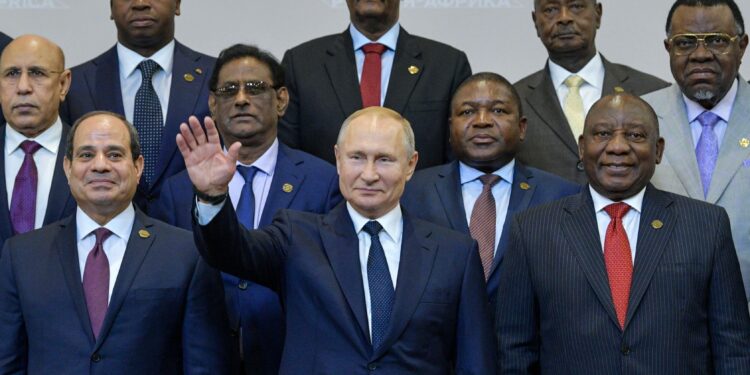Russian President Vladimir Putin has pledged to gift tens of thousands of tons of grain to African nations within the next few months, despite facing Western sanctions that have made exporting grain and fertilizers more challenging for Moscow. Speaking at a summit in St Petersburg focused on Russian-African ties, Putin emphasized Russia’s crucial role in global food security and its readiness to replace Ukrainian grain exports to Africa both commercially and as aid.
Putin announced plans to provide countries like Burkina Faso, Zimbabwe, Mali, Somalia, Central African Republic, and Eritrea with 25,000 to 50,000 tons of free grain each in the coming months. Additionally, Russia will ensure the free delivery of these products to the consumers in these countries. The announcement received applause from summit participants.
The summit is part of Russia’s ongoing efforts to extend its influence and business relations in Africa. Despite the abortive mutiny involving Russia’s Wagner Group, the country remains actively engaged on the continent.
In response to Western criticism of Russia’s withdrawal from the Black Sea grain deal, which allowed Ukraine to ship grain from its seaports amid the ongoing conflict, Putin argued that the promises made to Russia regarding facilitating its own grain and fertilizer exports had been disregarded. The United Nations Secretary-General, Antonio Guterres, had previously expressed concern over the increase in world food prices due to the collapse of the Black Sea deal and Russia’s bombing of Danube river ports used by Ukraine for exports.
Putin emphasized that over 70% of Ukrainian grain exports under the lapsed deal went to higher-income countries, including in the European Union, while the poorest countries, like Sudan, received less than 3% of the shipments. However, he did not mention the impact of Ukrainian supply on lowering global market prices.
The Russian president blamed Western sanctions, imposed in response to Russia’s war in Ukraine, for obstructing the supply of Russian grain and fertilizers to impoverished nations. Putin criticized Western countries for hypocritically blaming Russia for the current crisis situation on the world food market.
African Union chair Azali Assoumani, who was present at the summit, appealed for peaceful co-existence between Russia and Ukraine, highlighting the importance of food exports to the lives of those who depend on them.
While 49 of Africa’s 54 states were represented in St Petersburg, the number of attending leaders was lower than in the previous summit in 2019. The Kremlin attributed this decline to efforts by Western countries to dissuade leaders from participating.
Putin listed several sectors where Russia was willing to share its expertise or engage in business with Africa, including energy, media, transport, trade, financial services, medicine, agriculture, and car manufacturing. He also expressed readiness to welcome more African students to Russia.
The summit program includes panel discussions on various topics, including security, nuclear energy, artificial intelligence, education, and sports. Visiting dignitaries were also invited to explore Russia’s imperial palaces and watch a gala football match between Russian and African “football legends.”










